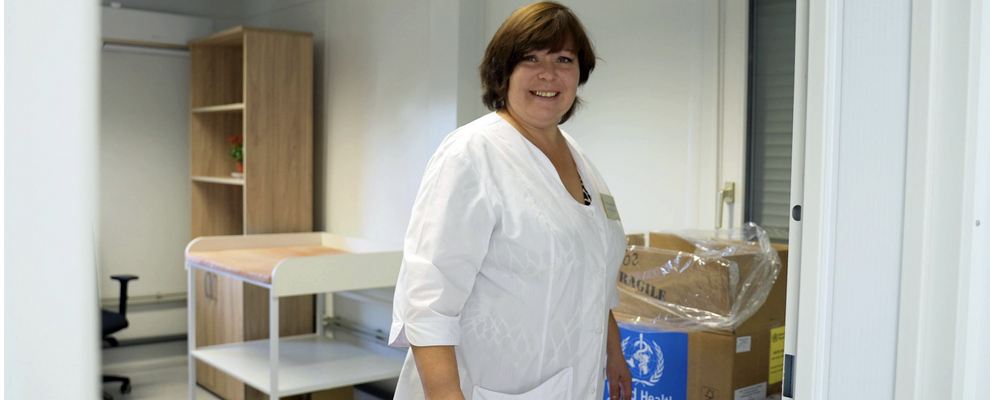Modular health-care clinics serve front-line communities
Ukraine | 2023 | CBPF
Ukraine, Kharkiv. The war in Ukraine continues to bring daily destruction across the country, severely impacting and disrupting the health-care sector. WHO has recorded over 1,300 attacks on health care since 24 February 2022.
To ensure continued access to primary health-care services in rural areas where facilities have been destroyed or irreparably damaged, WHO and the Ministry of Health of Ukraine have opened new, modular primary health-care clinics. The project is supported by the Ukraine Humanitarian Fund and other donors.
Modular clinics can be assembled and installed in under two weeks, using prefabricated modules, depending on the required number of rooms. All clinics are equipped with essentials like electricity, sanitary facilities, sewage systems, waiting rooms and patient examination rooms. Generators and fans are provided to maintain an optimal environment.
The newly installed clinic in Tsyrkuny, staffed with three doctors, will be open six days per week to serve a community of more than 3,700 people. Consisting of eight modules – a fully functional medical facility – it replaces the village’s original outpatient clinic, which was destroyed in the spring of 2022.
The outpatient clinic for general practice and family medicine in the village of Hrakove is also replacing the dispensary destroyed last year. It will be staffed with a doctor and two nurses:the same people who worked in the original facility, ensuring continuity of care. The Hrakove clinic will serve around 300 people, open five days per week.
Given the facilities’ proximity to the contact line, WHO has equipped both clinics with a dedicated shelter nearby, providing a secure haven for ten people at a time.
Emanuele Bruni, the WHO Country Office Incident Manager, noted, “Modular facilities are incredibly nimble health-care units that can be quickly installed on the spot. These units are one of WHO’s key projects for response and recovery in Ukraine to ensure continued access to much-needed care for residents of rural communities and those returning home.”
He added, “While these facilities are ultimately a temporary solution, they are essential to bolstering trust in the health-care system and serving as replacements for damaged facilities for up to ten years.”
Original story: adapted from original story by WHO
More information about the Ukraine Humanitarian Fund
